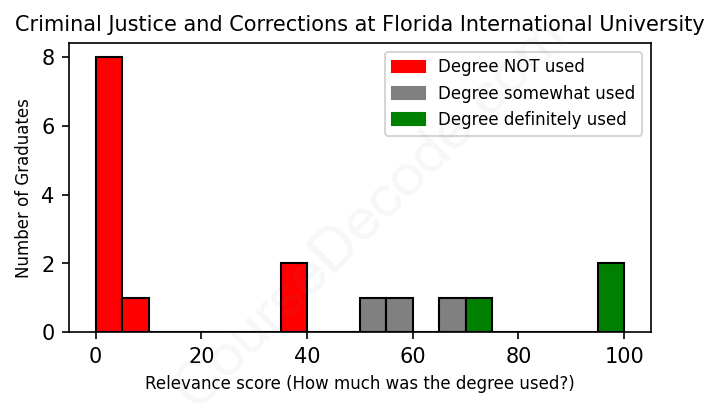
First, some facts. Of the Criminal Justice and Corrections graduates from Florida International University we've analyzed , here's how many have used (or NOT used) their degree in their career:

These are estimates based on AI analysis of 17 LinkedIn profiles (see below).
The verdict? Horrible! Overall, with an average relevance score of 31%, Criminal Justice and Corrections graduates from Florida International University have an exceptionally lower likelihood (-36%) of finding work in this field compared to the average graduate across all fields:
And for comparison, here's the chart for all profiles we've looked at across all degrees.
Also, after graduating, 52% of these graduates have pursued further education other than another Bachelor's degree (such as a Masters degree or other), compared to the average across all profiles of 35%. This suggests you may need more than just a Bachelors degree to be competitive as a Criminal Justice and Corrections graduate.
See the details:
|
Relevance score: 5% We think this person has NOT gone into a career related to their degree. We think this person has NOT gone into a career related to their degree.
DEGREE INFOGraduated in 2018 from Florida International University with a Bachelor's degree in Criminal Justice and Corrections. No other secondary education since. JOB HISTORY SINCE GRADUATIONLegal Intern Broward Public Defender's Office 17th Judicial Circuit Jan 2018 - May 2018 Office Assistant  Robert Half Jan 2019 - Apr 2019 City Carrier Assistant  United States Postal Service Jun 2019 - Present ABOUTNo information provided. |
The top 10 most common jobs done by the graduates we've analyzed (ranked most common to least) are:
When looking at the jobs held by graduates with a degree in Criminal Justice and Corrections from Florida International University, it’s clear there’s a mix of roles. Many individuals pursued paths directly related to the criminal justice field, such as Judicial Interns, Law Clerks, and various positions within law enforcement, like Police Dispatchers and Crime Analysts. These roles typically require a strong understanding of criminal justice principles and allow graduates to apply their academic knowledge in practical settings, making them quite relevant to their studies. For example, becoming an Attorney or working as an Investigator directly correlates with what they learned in school and demonstrates how their education can lead to impactful careers in law and public safety.
However, not all graduates followed this path. Some ended up in roles that have little to do with criminal justice, like Real Estate Agents, Customer Service Representatives, or even Bartenders. These positions focus more on sales, customer service, or administration, which can leave one wondering how their studies prepared them for such jobs. While skills like problem-solving and critical thinking are valuable in any career, many of these roles do not explicitly utilize the specialized knowledge from a Criminal Justice and Corrections degree. Overall, it seems that while a number of graduates are successfully working in areas relevant to their degree, there’s also a noticeable fraction who have ventured into unrelated fields, suggesting that a degree in this area may not always dictate their career path as clearly as one might expect.
Here is a visual representation of the most common words in job titles for Criminal Justice and Corrections graduates (this is across all Criminal Justice and Corrections graduates we've analyzed, not just those who went to Florida International University):

Based on the career trajectories of alumni from Florida International University who graduated with degrees in Criminal Justice and Corrections, it seems like many of them have landed fairly relevant positions in the field. For instance, several graduates started off their careers as judicial interns or legal clerks, which is a pretty solid route for someone aiming to work in law or public safety. Fast forward a few years, and many of them have moved into roles such as attorneys, police officers, and crime analysts, showing a natural progression in their careers that aligns with their studies. It appears that the first jobs for many are often internships or entry-level positions in the legal system, which makes sense since gaining practical experience is key in this field.
However, while there are definitely some success stories, not everyone sticks strictly to law enforcement or legal roles as their careers evolve. For example, some graduates have ventured into entirely different industries like real estate and even roles in customer service. This shift suggests that while a degree in Criminal Justice can open doors, it doesn't always mean graduates will stay in that lane long-term. Five to ten years after graduation, you’ll find a mix of those who have advanced in relevant fields and others who have branched off into other realms. So, it’s a bit of a mixed bag—great for those who want to stay in criminal justice, but there are also folks who find their paths lead them elsewhere. Overall, the degree is quite versatile, but it really depends on individual aspirations and opportunities that come their way.
Hey there! So, getting a Bachelor’s degree in Criminal Justice and Corrections at Florida International University, or pretty much anywhere else, is considered to be on the easier side compared to some other majors. It's definitely challenging—you’ll have to read a lot and maybe dive into some intricate theories of law, psychology, and sociology—but it’s generally not as heavy as some STEM degrees. If you keep up with your readings, participate in discussions, and stay organized, you’ll find that it’s pretty manageable. Plus, if you’re interested in the subject, it can actually be pretty engaging! So, if you’re thinking about it, just stay focused, and you’ll do just fine!
Most commonly, in the LinkedIn profiles we've looked at, it takes people 2 years to finish a Bachelor degree in Criminal Justice and Corrections.
Looking at these graduates from Florida International University, it seems like some have found a decent path to solid income, while others may still be hustling for better pay. For instance, the one who became a VP at Banesco USA and the crime analyst at the sheriff's office likely earns pretty well, which is great for someone in their career stage. On the other hand, roles like the pizza delivery driver or the concierge look like they're still juggling low-paying jobs. So overall, it’s kind of a mixed bag; some folks are stepping into higher roles and possibly making decent money, while others are probably still figuring things out and might not be earning as much as they'd like right now.
Here is a visual representation of the most common words seen in the "about" section of LinkedIn profiles who have a Bachelor degree in Criminal Justice and Corrections (this is across all Criminal Justice and Corrections graduates we've analyzed, not just those who went to Florida International University). This may or may not be useful:

Here are all colleges offering a Bachelor degree in Criminal Justice and Corrections (ordered by the average relevance score of their Criminal Justice and Corrections graduates, best to worst) where we have analyzed at least 10 of their graduates:
| College | Score | Count |
|---|---|---|
 American Military University American Military University
|
52 | 13 |
 Bridgewater State University Bridgewater State University
|
50 | 13 |
 University of Central Florida University of Central Florida
|
47 | 14 |
 University of North Texas University of North Texas
|
47 | 14 |
 University of Phoenix University of Phoenix
|
41 | 23 |
 University of Cincinnati University of Cincinnati
|
41 | 12 |
 Sam Houston State University Sam Houston State University
|
35 | 22 |
 John Jay College (CUNY) John Jay College (CUNY)
|
35 | 12 |
 Ferris State University Ferris State University
|
34 | 14 |
 Florida International University Florida International University
|
31 | 17 |
 Liberty University Liberty University
|
31 | 10 |
 California State University-Sacramento California State University-Sacramento
|
24 | 14 |
 Colorado Technical University Colorado Technical University
|
24 | 16 |